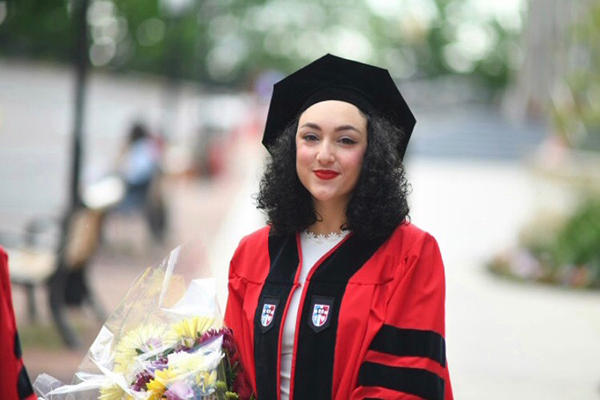
MANHATTAN — “What’s next?”
Each May, that’s the biggest question many university graduates face.
Commencement ceremonies are quickly followed by job searches, internships, and first days of work, but for students who have recently received degrees in the healthcare field, the “what ifs” have grown exponentially with the spread of the coronavirus.
The first year has always been the hardest, but in these times the first 365 days are coming with a serious learning curve.
At a time when hospitals are facing shortages of personal protective equipment, beds, and staff, the newest generation of healthcare professionals is stepping in, getting creative, and filling in the gaps.
These newly-minted medical heroes are grappling with the uncertainty of what our lives will be as we adapt to a world without a coronavirus vaccine, and work to create one with it.
Pulling long hours in the pharmacy department managing medications during a global pandemic is definitely not how Gianna Galioto imagined her first year of residency would go.
Galioto is a postgraduate year one pharmacy resident at a community teaching hospital in New Brunswick, New Jersey.
“You’re still in your training phase, but you are a licensed pharmacist and you’re still actively practicing as a pharmacist,” she told The Tablet.
When the pandemic began, the Class of 2019 St. John’s University graduate had just started her intensive care unit rotation.
“Really the first places that got hit were emergency departments and ICUs,” she explained. The focus of her learning promptly shifted, and she pivoted to socially distant, off-site learning.
“Quickly, we realized that the need was to have pharmacists on our COVID-19 teams,” Galioto said. “Everyone had to be all hands on deck, ready to be flexible, go where the need was.”
With the hospital spread thin, new pharmacy residents were brought in to put in extra hours and begin working alongside pulmonologists, infectious disease doctors and general hospitalists to help combat the virus.
While many imagine someone like Galioto as behind the counter at their local pharmacy, at a hospital, Doctors of Pharmacy serve similar functions but find solutions to more acute problems.
“Pharmacists tend to take the backseat,” she explained, “but without drugs, the hospital can’t run.”
Galioto checks medication orders that come in for patients, collaborating with doctors to ensure that they don’t interact with anything else the patient is taking.
In a hospital during the days of COVID-19, “there are more drugs, more IVs, more questions,” Galioto told The Tablet. “Normally there are guidelines. When COVID hit, that all went out the window. Nobody knew what to do … we’ve basically gone back in time.”
Fresh out of pharmacy school, Galioto is right alongside medical veterans who are also learning about the disease as it develops. At 25 years old, she has already helped lead the charge in managing the shortage of sedation and pain medicine in her hospital.
Though green, she is preemptively finding solutions to drug shortages and determining the efficacy of the medications being administered to coronavirus positive patients.
“How do I dose this? What’s the reason behind that?” she explained. “It’s definitely more quick thinking.”
The experience has been eye-opening.
“We felt untouchable, that all of these things don’t happen here. This happens in China, this happens in Africa, only where they don’t have resources. This doesn’t happen in America,” Galioto told The Tablet. “We were grossly unprepared for what was to come.”
One of the challenges pharmacists at the hospital faced was securing Remdesivir, a process that involves advocating for inpatient use on the basis of compassionate use.
“You had to apply to a drug manufacturer,” she explained. “My patient needs a drug for this, this, and this reason. This is why you should give it to us.”
Despite the sought-after drug now being readily available to her hospital, the toughest part of her long days with fluctuating hours is going into the hospital each day and knowing that lives may be lost.
“The medication doesn’t necessarily mean that they’re going to survive,” she recognizes, but the new doctor feels humbled by the hard work, passion, and resilience of those she works with each and every day.
Galioto is just one of the hundreds of medical professionals dealing with the same issues, “all working together.”
“Everyone is sharing information and doing their best,” she added.
To read the latest updates regarding coronavirus concerns in the Brooklyn Diocese, go to https://thetablet.org/coronavirus.
